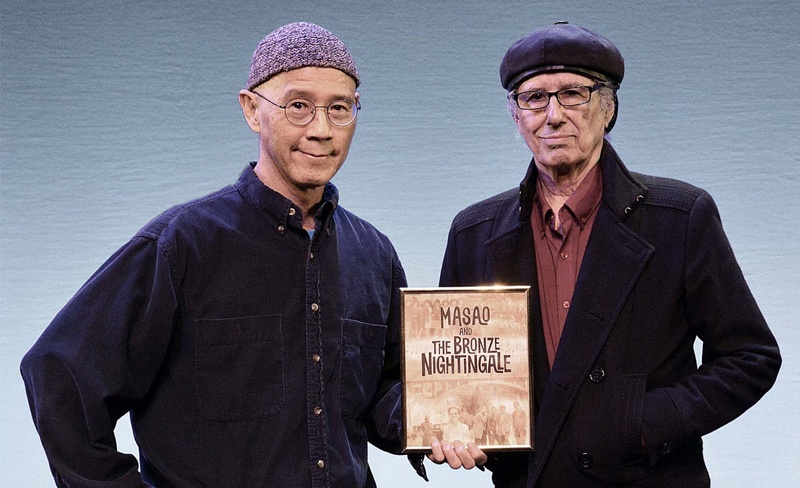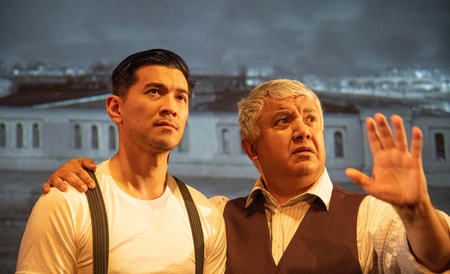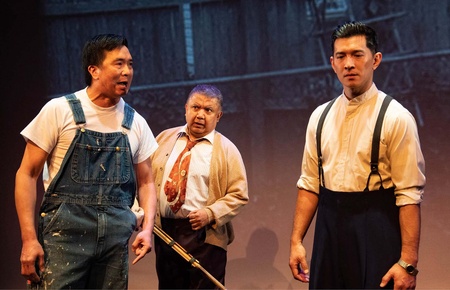After years of partnership and production, Dan Kwong and Rubén Funkahuatl Guevara’s Masao and The Bronze Nightingale has finally set stage at the CASA 0101 Theater in Boyle Heights.
Based on Guevara’s short story of the same name, Masao and The Bronze Nightingale is set in post-war 1940s Bronzeville—a thriving African American community that sprouted in Little Tokyo after Japanese Americans were forcibly removed.
As Japanese American jazz musician Masao Imoto (played by Michael Sasaki) navigates through the vibrant, multicultural L.A music scene and his love for the “Bronze Nightingale,” an African American jazz singer named Charlene Williams (played by Angela Oliver), audience members get a taste of the rich history of Mexican, Japanese, and African American solidarity that blossomed in the Los Angeles area.
Masao and The Bronze Nightingale’s original plotline was first published in 2015 as a short story by musician, author, and bonafide Angelino, Rubén Funkahuatl Guevara. In addition to online research, Guevara drew from a number of personal inspirations—including a Miles Davis autobiography and his own Boyle Heights upbringing.
“Unknown L.A history and its multicultural stories keeps me inspired,” Guevara says, “I was born in Boyle Heights and raised all over L.A and returned to BH forty years ago where I continue to mine its past and present history.”
Drawing further influence from an ensemble of histories, the fictional characters of Masao and The Bronze Nightingale were crafted from real-life figures and personas as well:
“Masao Imoto is based on a close high school friend, Stanley Imoto, a Pachuco-like character. Mr. Casillas is based on my cousin Valerio Casillas who was a zoot suit tailor in the 1940’s and Mrs. Casillas is based on my aunt Marina. Billie Holiday was the inspiration for Charlene Williams, the Bronze Nightingale. Mrs. Imoto was named Yuriko, and Junko the waitress in the play, after real life sisters who ran Suehiro’s Cafe in Little Tokyo. They were close friends who used to buy art supplies for my youngest son at Christmas,” he thoroughly recalls.
The story became a finalist for the Little Tokyo Historical Society’s second Imagine Little Tokyo short story contest, and whispers of a play adaptation with theater artist Dan Kwong emerged in November 2018.
Funded first by the Eastside Arts Initiative and, later, by the California Arts Council and Department of Cultural Affairs, Los Angeles, Masao and The Bronze Nightingale began its evolution from short story to stage play in early 2019 with Guevara as writer and Kwong as writer and director.
After the project’s commencement, Guevara and Kwong soon began to devise the play’s script, with the latter working on transitioning the short story’s concise, two-thousand-plus word format into a lengthier, amplified stage play.
Giving the characters what Guevara calls “more obstacles to overcome and grow as individuals,” Kwong incorporated some of the struggles that Japanese Americans, in particular, grappled with during this era—including the adjustment to Little Tokyo’s transformation into an African American neighborhood and elements of internalized racism.
Notably, Kwong’s own family history has played a role in both the script’s construction and his overall artistic direction.
“The experiences of my mother and her family during WWII were formative to my consciousness about oppression and social justice,” he says, “I began hearing stories about Manzanar when I was six years old, and this cultural landmark has informed my artwork from the beginning of my career.”
Aside from writing with Guevara, Kwong’s role in Masao and The Bronze Nightingale as director has also provided moments of self-reflection and, at times, adaptation.
“I've been a solo performance artist for over 30 years, so the traditional stage play format is still something new to me. I was attracted to the idea of furthering my experience in another artistic genre. I'm always looking for new artistic challenges that scare the hell out of me. This one has been totally terrifying, pushing me to the edge of my abilities and knowledge. When I am scared to death that I won't be able to do something is when I know I am in the growth zone.”
On top of overcoming artistic challenges, being the director of Masao and The Bronze Nightingale has meant facing a handful of organizational challenges as well. According to both Guevara and Kwong, casting characters grew to become one of the play’s greatest obstacles.
Besides finding a suitable casting for Masao Imoto, the play, at one point, struggled to retain actors—a week after being cast, a total of four actors dropped out due to other project offers or scheduling conflicts.
Nevertheless, as is often said in the theater world, the show must go on.
Today, Kwong praises actor Greg Watanabe’s willingness to come on board a mere 11 days before the first preview show. Guevara further points out that the casting for Masao Imoto was eventually assigned to Michael Sasaki and warmly praises Kwong’s directorship:
“Dan has done a herculean job of directing Michael Sasaki as Masao since the role is very complex,” Guevara notes, “The results are very positive.”
It’s worth noting here that Masao and The Bronze Nightingale isn’t Guevara and Kwong’s first project together. Initially meeting at a grant evaluation event for the Department of Cultural Affairs back in 1989, Kwong states that “Today, we are practically artistic brothers, having worked on several projects together, year after year.”
“Our partnership has been based on mutual respect. Dan will always go the extra 100 miles to make sure the project is as good as it can be. He is the consummate professional and a Zen theater genius,” Guevara enthuses.
Likewise, he’s quick to note Kwong’s extensive role in the play: “Most of the script and all of the multimedia production design is Dan’s work. This is his play based on my short story. His masterpiece.”
Masao and The Bronze Nightingale will run from April 22 to May 15 on Fridays and Saturdays at 8 p.m., and Sundays at 3 p.m.. While the stage play is currently performed exclusively at CASA 0101, both writers are not opposed to seeing its plot and message expand into film.
“Though it is very much a Los Angeles story, I'd love to see this play produced around the country. And I have always envisioned it as a feature film—which I'd love to write the screenplay for but find someone else to direct,” Kwong remarks.
But for now, while it runs its course through CASA 0101, Guevara and Kwong hope that audience members will hear their messages ring strong:
“I want audiences to learn about the history of the solidarity between the Mexican, Japanese, and African American community of Boyle Heights and Little Tokyo. To see that it is possible for a multicultural nation to respect and work together for the good of all,” says Guevara.
“Personal transformation is possible,” Kwong voices, “It is possible to heal and repair even the most difficult relationships. Communities of color have a history of solidarity and alliances with each other, and that continue to this day.”
* * * * *
Join writers Dan Kwong and Rubén Funkahuatl Guevara at the Tateuchi Democracy Forum of JANM for a conversation moderated by Kristen Hayashi around their new play, Masao and The Bronze Nightingale on May 3, 2022 from 6 p.m. to 7:30 p.m. PDT. This event will be offered both in person and virtual. It’s a free event, but RSVP is required here.
© 2022 Kyra Karatsu








